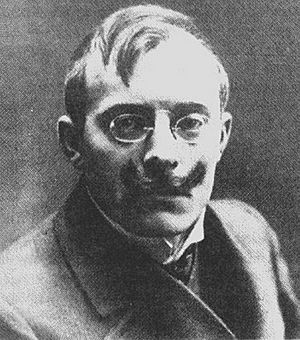Gabriel Scott facts for kids
Quick facts for kids
Gabriel Scott
|
|
|---|---|
 |
|
| Born | Gabriel Scott Jensen 8 March 1874 Leith, Scotland |
| Died | 9 July 1958 (aged 84) Arendal, Norway |
| Occupation | Poet, novelist, playwright and children's writer |
| Language | Norwegian |
| Nationality | Norwegian |
| Notable works | Tante Pose, Kilden, Det gyldne Evangelium, Fant |
| Notable awards | Gyldendal's Endowment, 1936 |
| Spouse | Ellen Johansen 1901–12 Dagmar Marie Jensen 1915–18 Birgit Gabrielsen 1918–1958 |
Gabriel Scott (born March 8, 1874 – died July 9, 1958) was a famous Norwegian writer. He wrote many different kinds of books. These included poems, novels, plays, and stories for children.
Contents
Who Was Gabriel Scott?
Gabriel Scott Jensen was born in Leith, Scotland. His father was a priest for sailors. His mother, Caroline Schytte Jensen, was also a writer and composer. He was named Scott after Scotland and the famous writer Walter Scott. When he was seven, his family moved to Norway. His father became a priest in a town called Høvåg. Gabriel Scott was married three times during his life. He passed away in Arendal, Norway, in 1958.
His Writing Journey
Gabriel Scott started his writing career in 1894. His first book was a collection of poems called Digte (which means 'Poems'). He quickly followed this with another poetry book in 1895. He also wrote love stories and collections of short stories.
Famous Books and Films
One of his well-known novels is Tante Pose ('Aunt Bag') from 1904. This book was later made into a film in 1940. His book Jernbyrden (1915) was a big success. It helped him become a very popular writer.
His most famous book is Kilden ('The Source'), written in 1918. It tells the story of a simple fisherman named Markus. Another important book is Det gyldne Evangelium ('The Golden Gospel') from 1921. In this story, Saint Peter and Our Lord travel and meet different people.
Scott also wrote popular books about the Indigenous Norwegian Travellers. These included Fant (1928) and Josefa (1930). The book Fant was also turned into a film in 1937. Another novel, De vergeløse ('The Defenseless'), became a film in 1939. This story was about a child taken from its mother.
Writing for Young Readers
Gabriel Scott wrote several books especially for children. One of his popular children's books is Sølvfaks som reiste ut i den vide verden. This means 'Sølvfaks Who Went out into the Wide World'. It was published in 1912 and has been printed many times since then. He also wrote Hellige tre konger ('We Three Kings') in 1900.
Later Life and Legacy
In 1936, Gabriel Scott received an important award called the Gyldendal's Endowment.
During the 1930s, Scott held some views that were debated. He wrote articles that some people found controversial. However, before World War II began, he changed his mind. During the war, he wrote poems that showed his love for his country.
Today, Gabriel Scott is seen as one of the most important poets from southern Norway. He is often mentioned alongside another famous writer, Vilhelm Krag.

